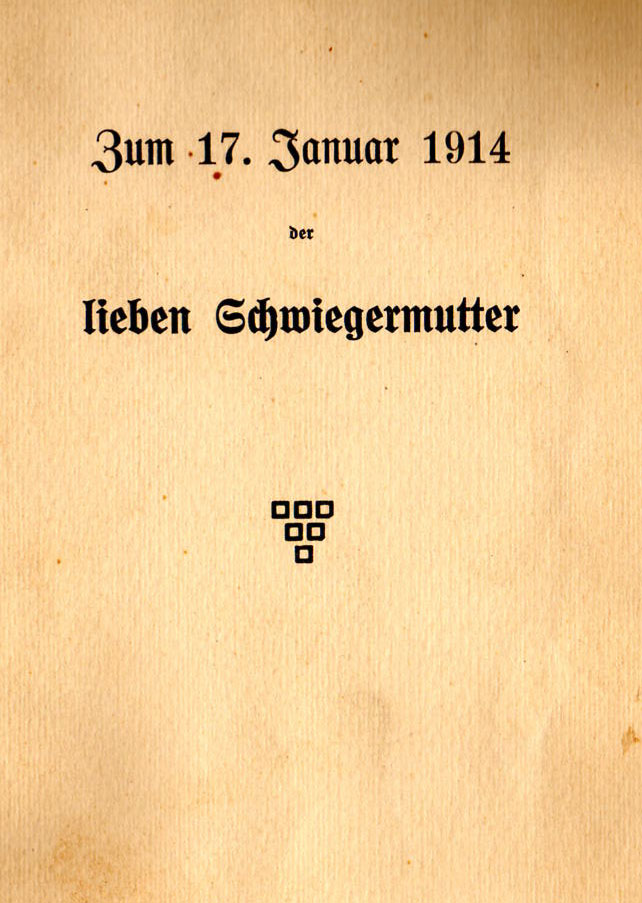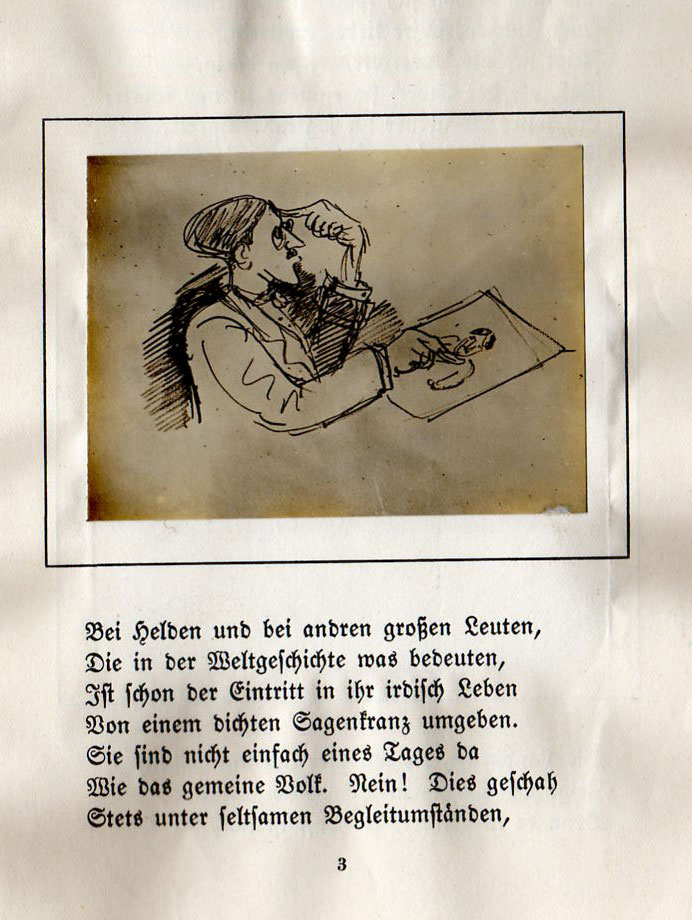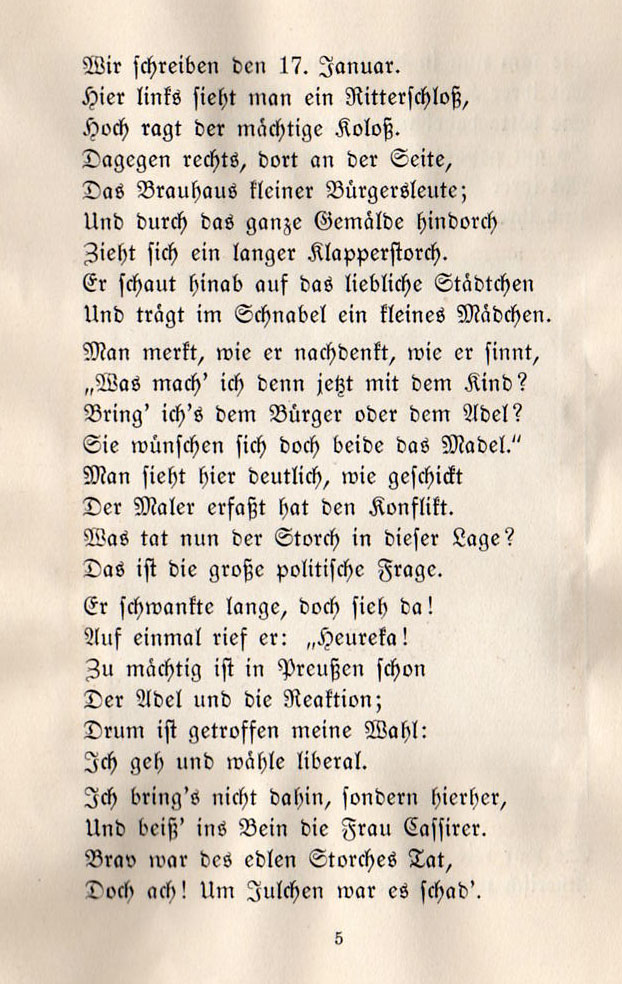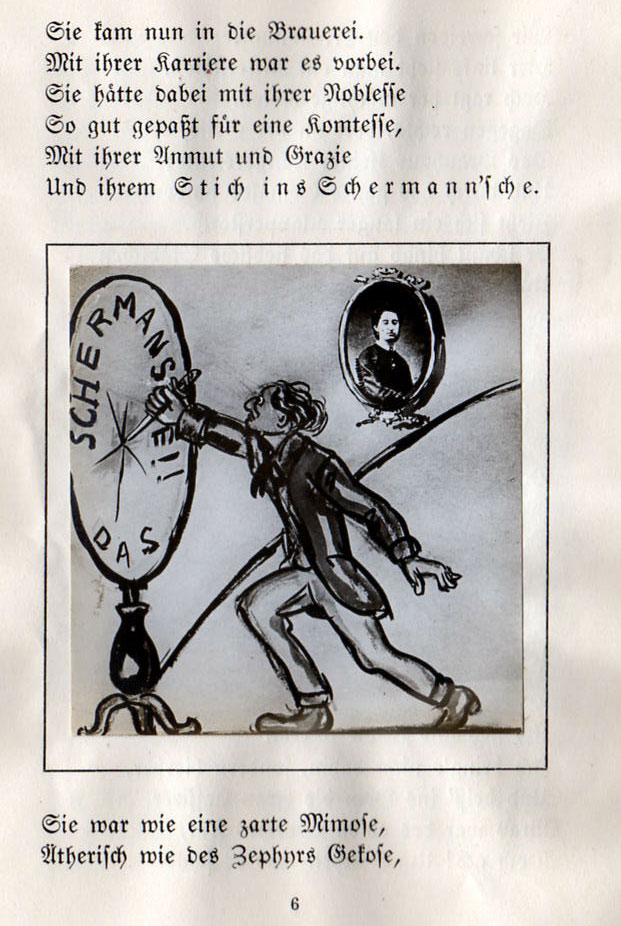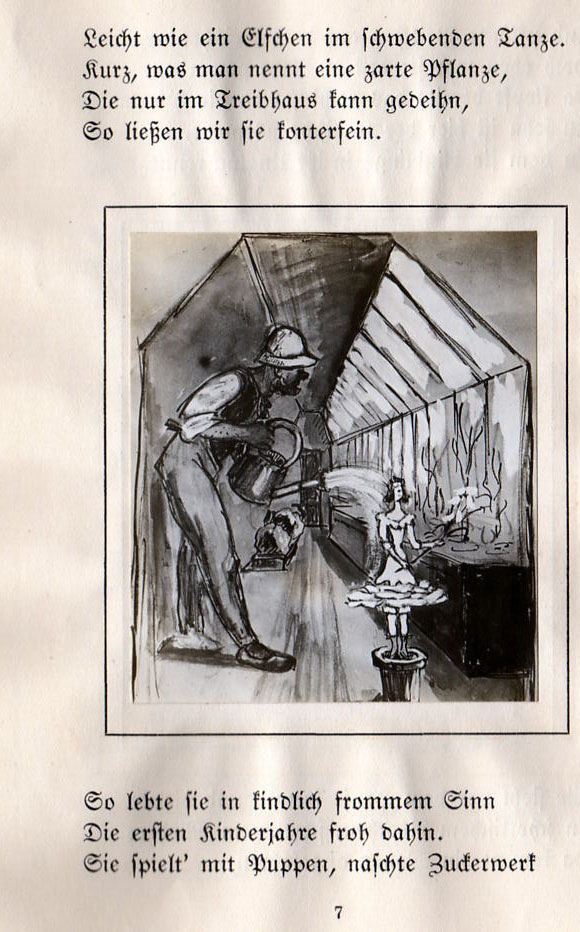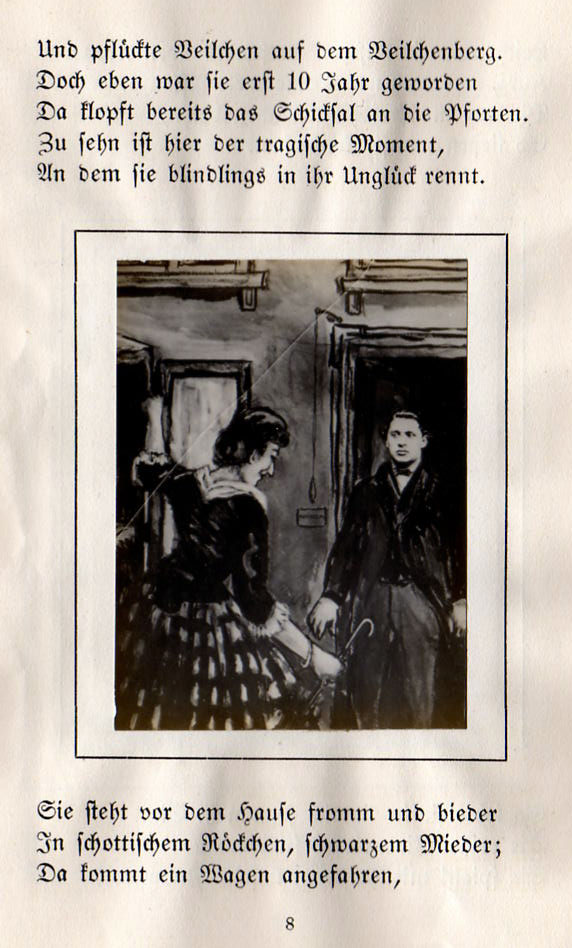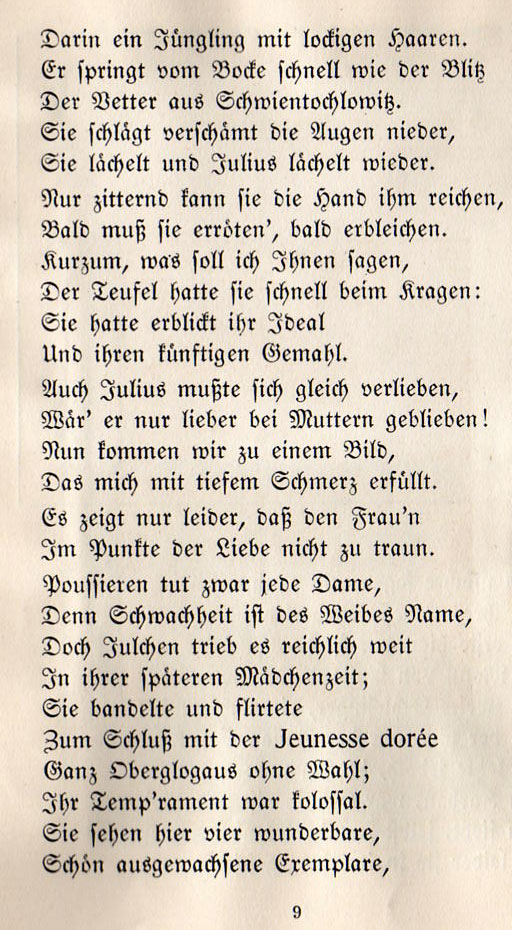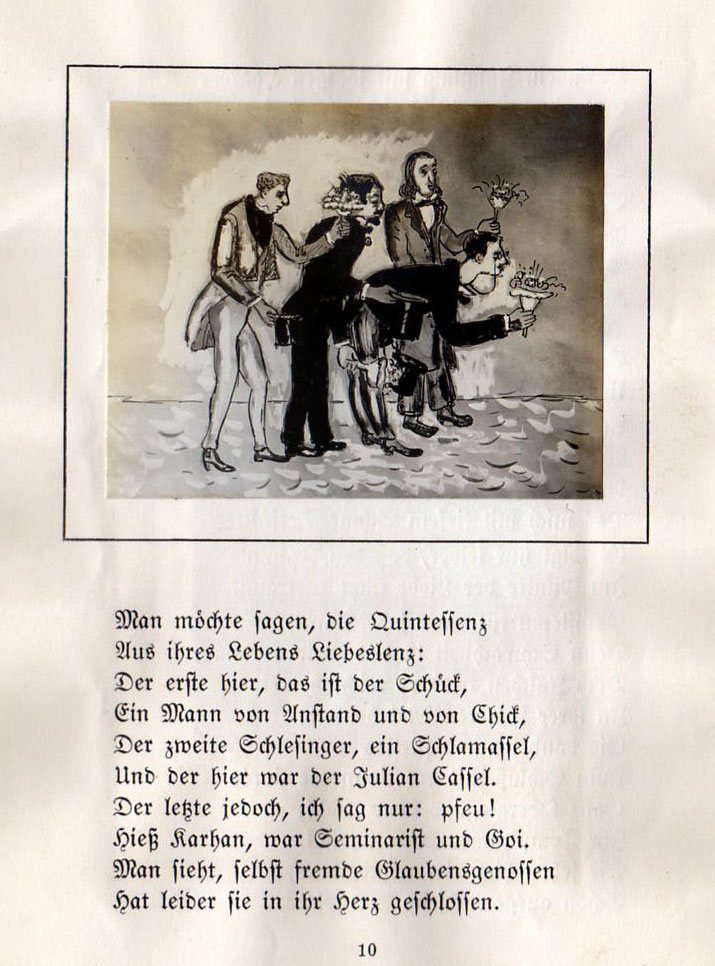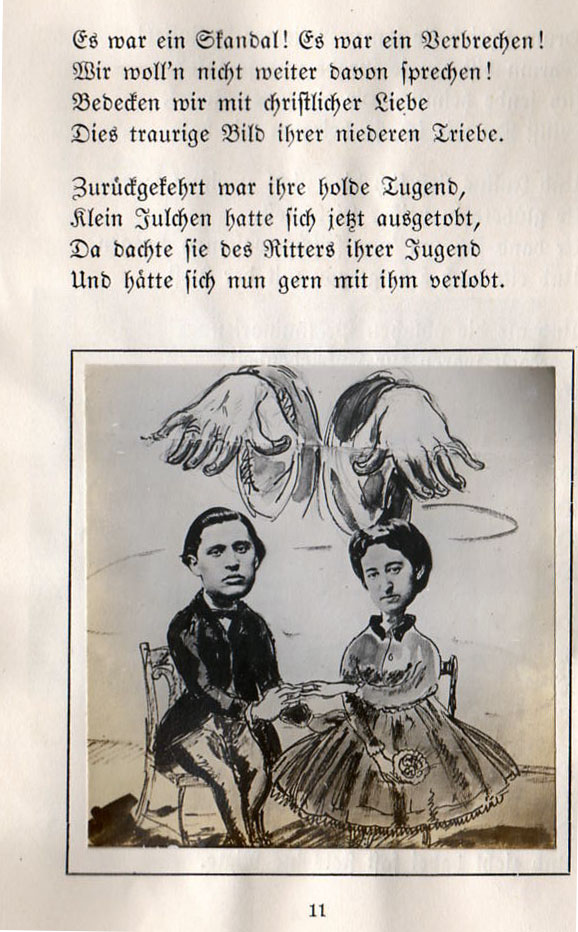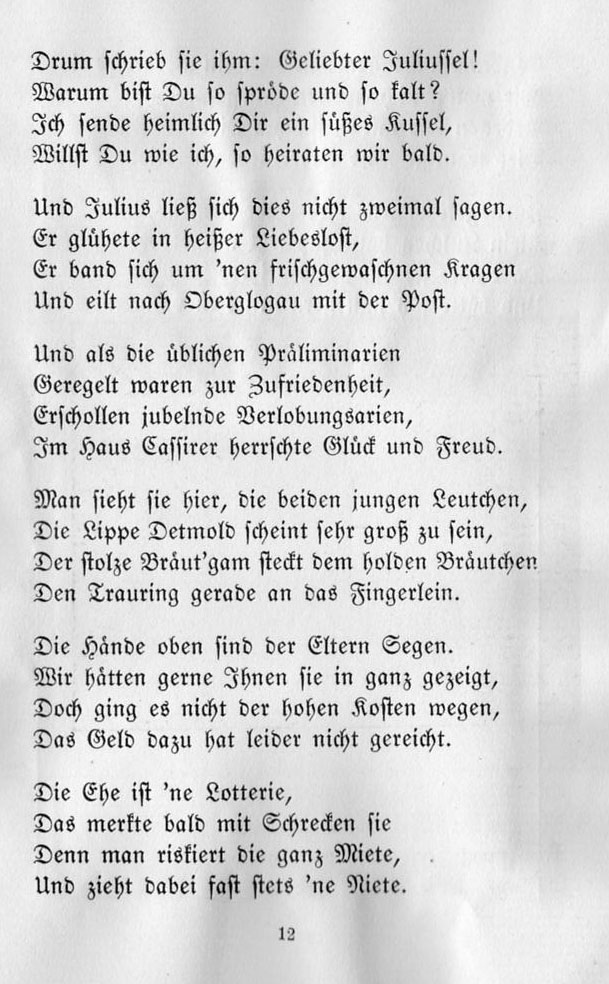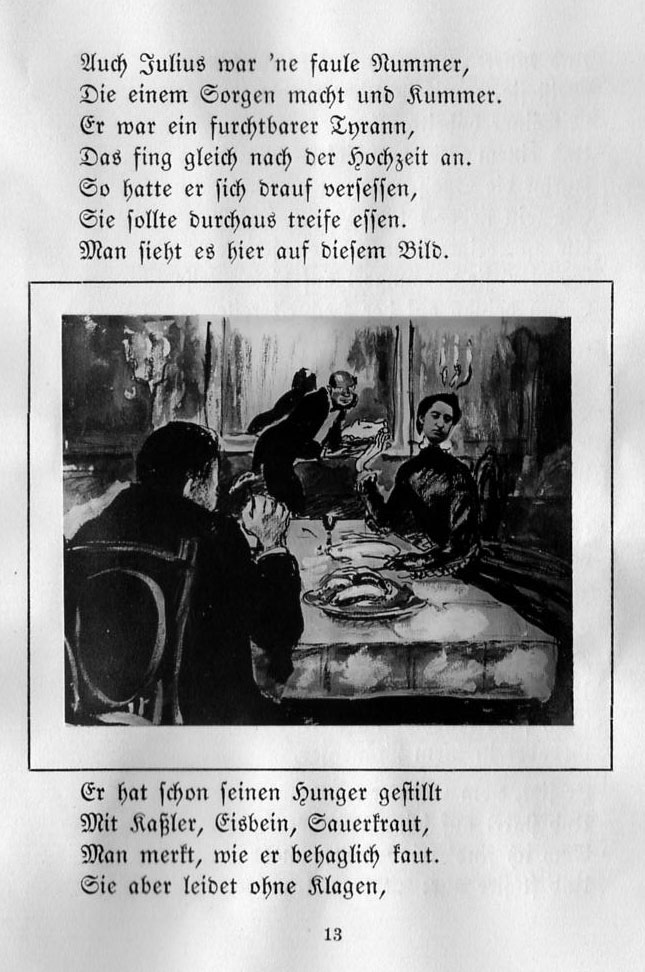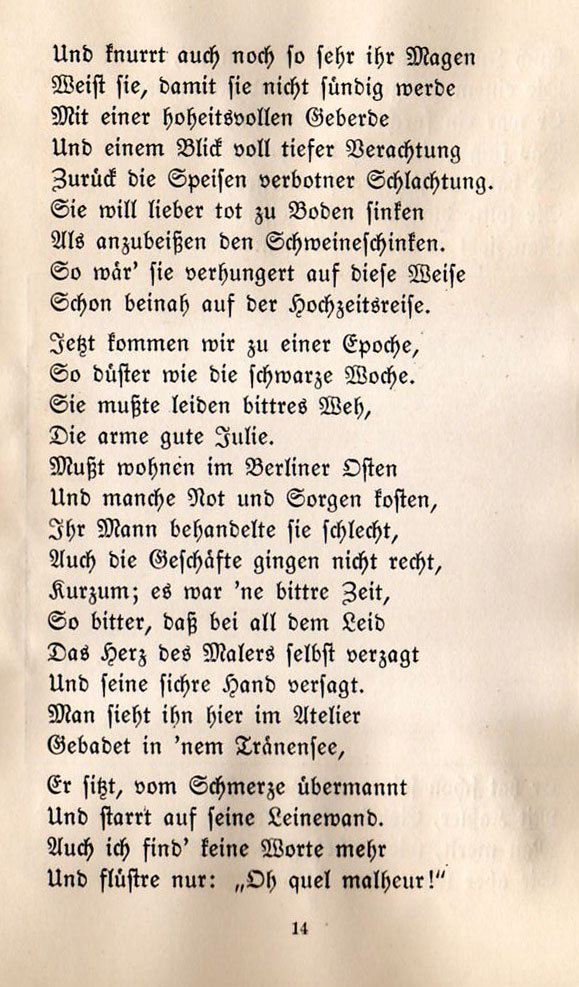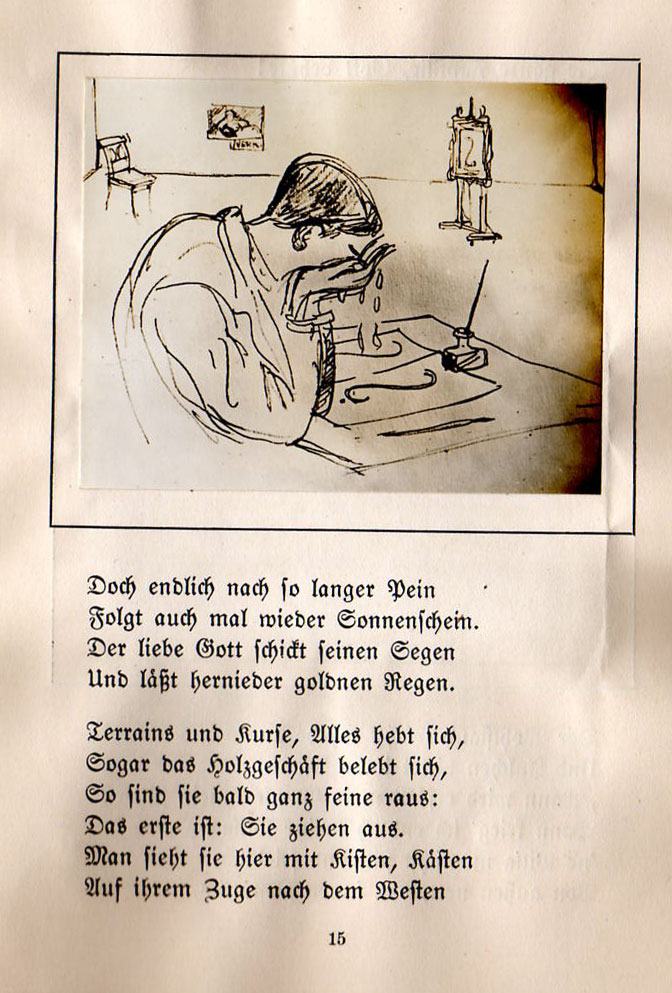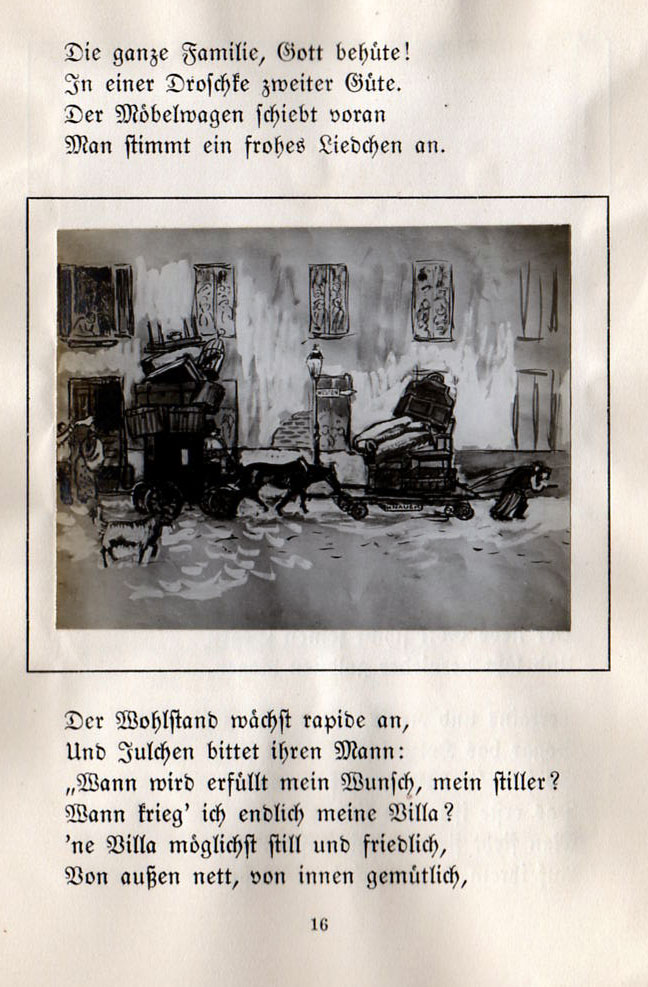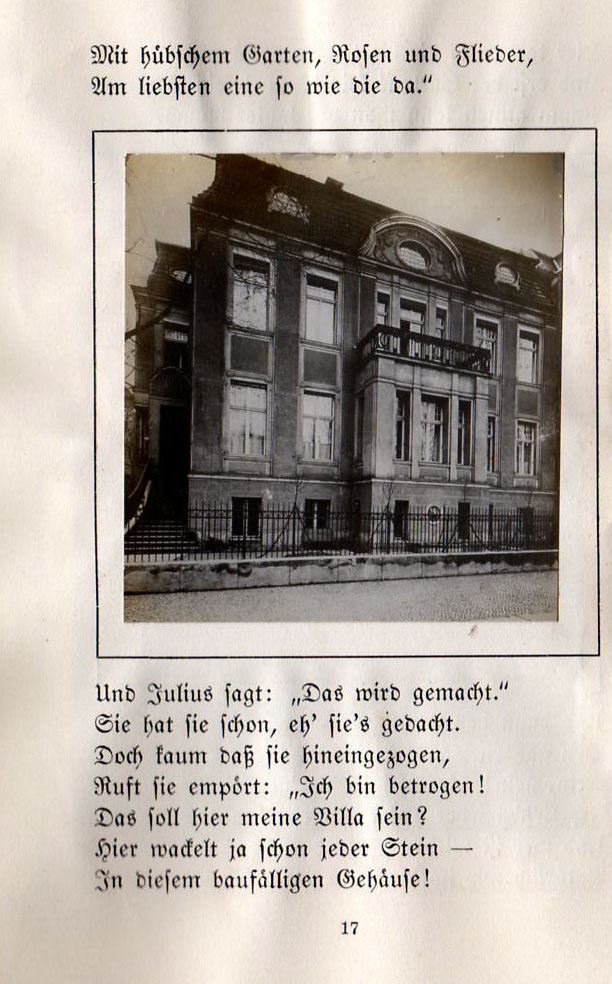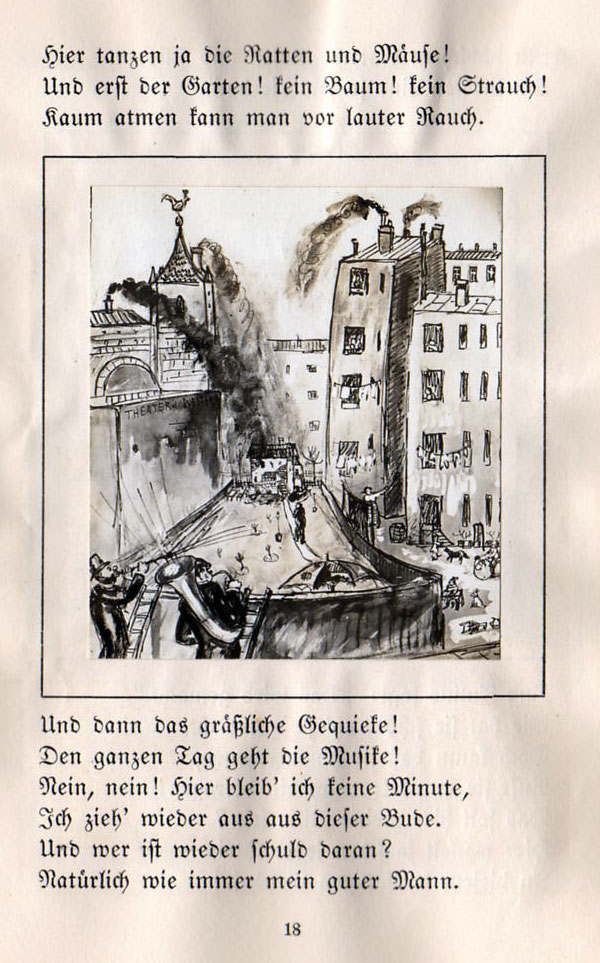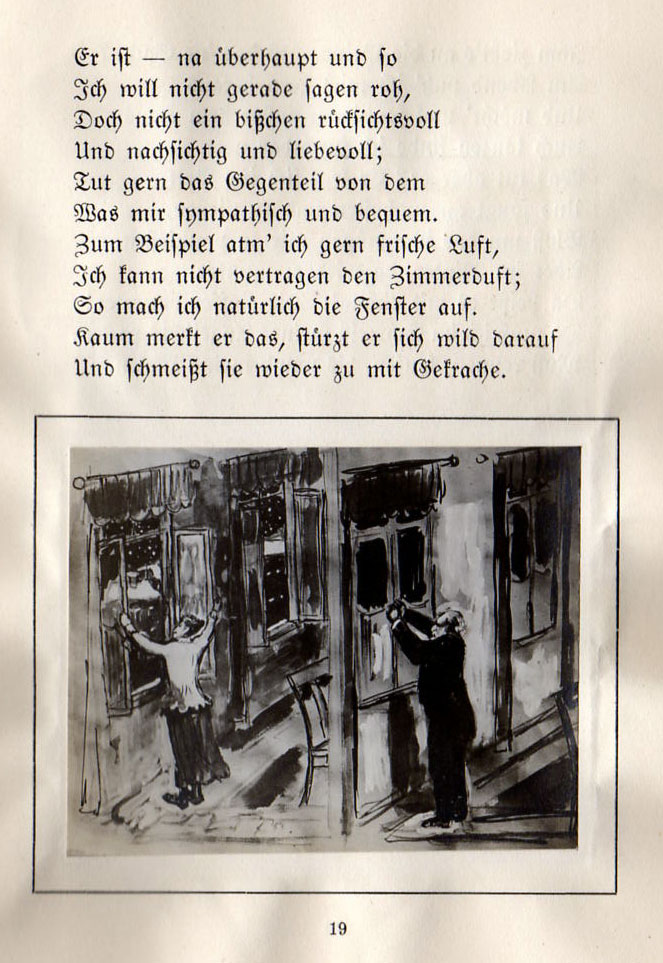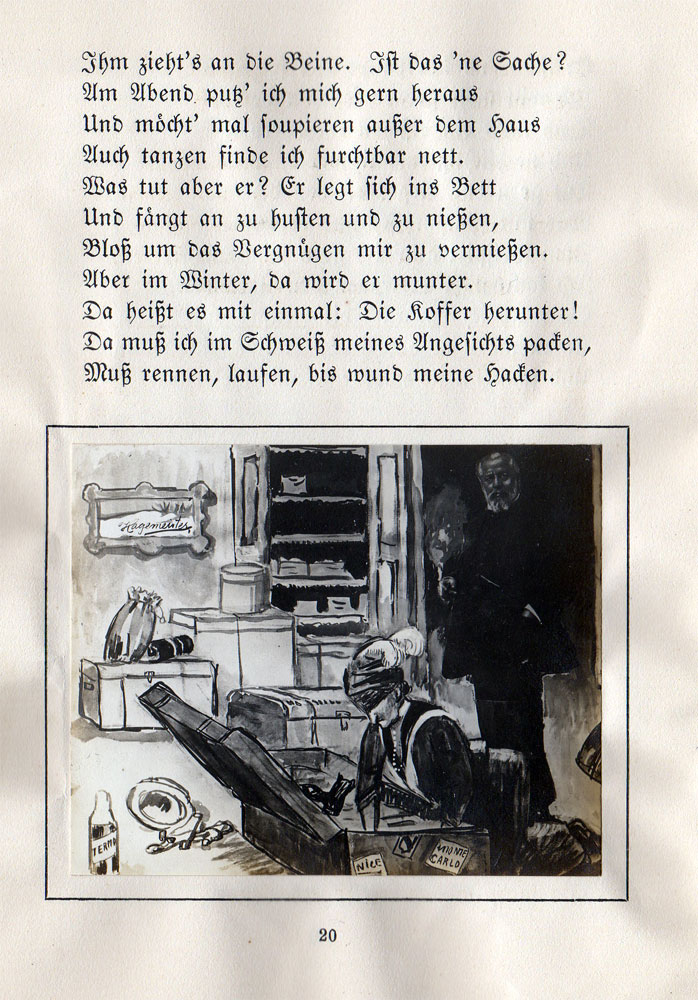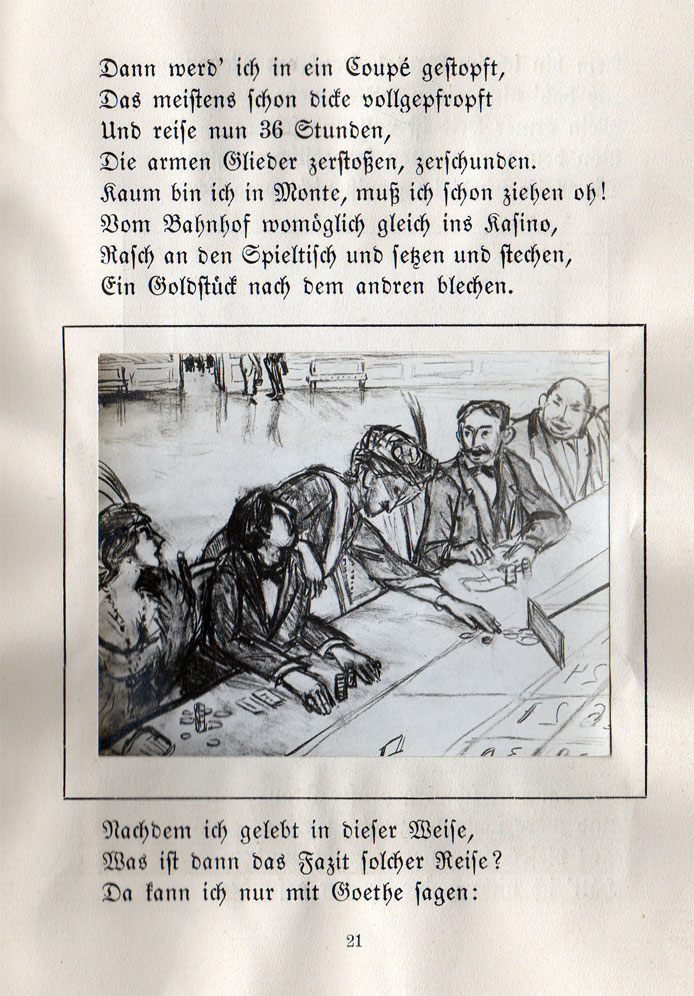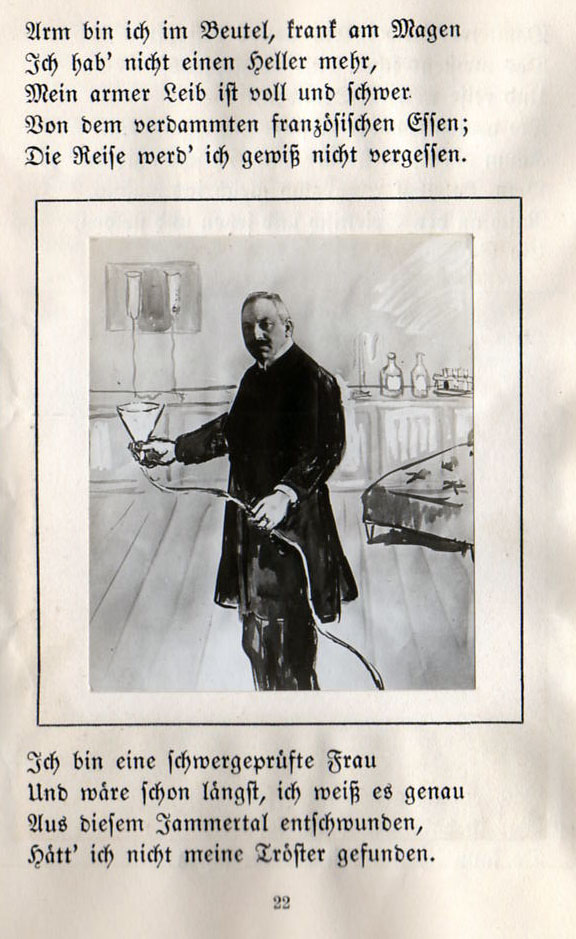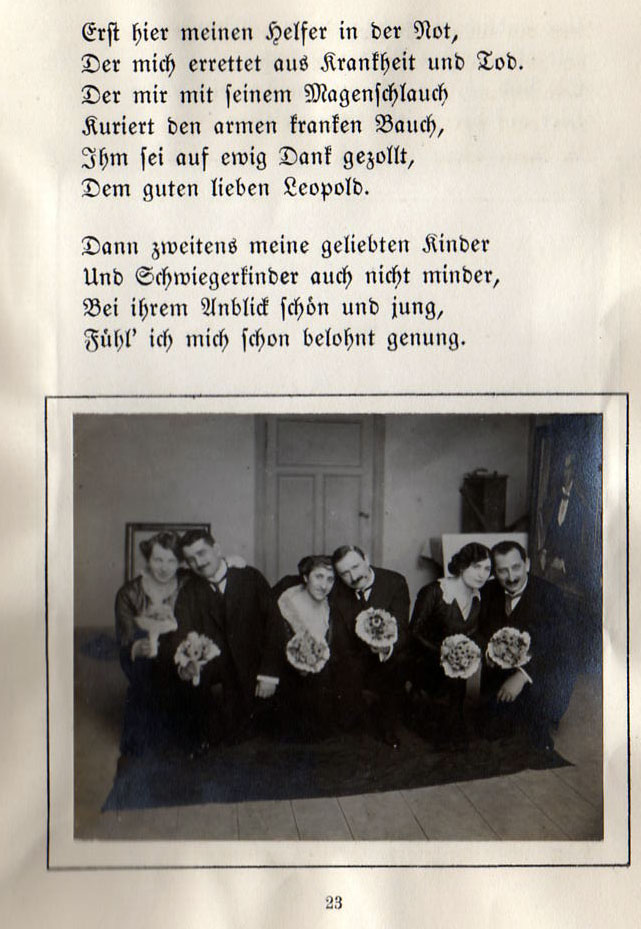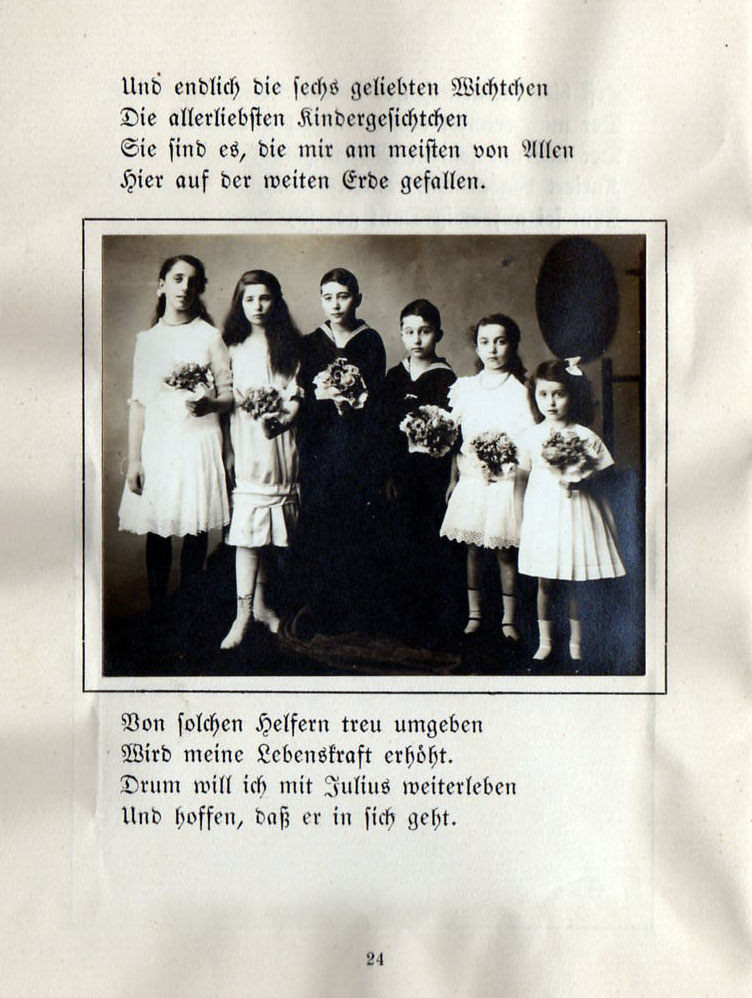| 4 |
Poem for Julchen Cassirer on her 70th birthday, 1914: by Max Loewenberg |
| Lieben Schwiegermutter Poem for his mother in law Julchen Cassirer by Max Loewenberg on the occasion of her birthday 17 January 1914 |
||||
| Cover |
||||
| Page 3 |
||||
| Page 4 |
||||
| Page 5 |
||||
| Page 6 |
||||
| Page 7 |
||||
| Page 8 |
||||
| Page 9 |
||||
| Page 10 |
||||
| Page 11 |
||||
| Page 12 |
||||
| Page 13 |
||||
| Page 14 |
||||
| Page 15 |
||||
| Page 16 |
||||
| Page 17 |
||||
| Page 18 |
||||
| Page 19 |
||||
| Page 20 |
||||
| Page 21 |
||||
| Page 22 |
||||
| Page 23 |
||||
| Page 24 |
||||
| Literal English Translation with commentary [Irene Newhouse] |
||||
| 17 January 1914 to my dear Mother-in-law. [From internal evidence, the mother-in-law in question was Julchen Cassirer Cassirer, married to Julius Cassirer. As we know of only one daughter, the only son-in-law she’d have had was Dr. Max Loewenberg. Who must therefore be the author.] [Rhyme scheme: 2 consecutive lines rhyme Meter – fast, 1,2 marching meter. This type of meter was VERY popular in Germany for writing poems that took sardonic aim at contemporary life. Wilhelm Busch, who did this prolifically, was a block-buster best seller who’s a byword in Germany. Less well-known today, but equally a block-buster best seller in his time - the teens & twenties - was Rideamus [let’s laugh in Latin] aka Dr. jur. Friedrich Oliven. [Who made considerably more money off his rhymes than he ever did as attorney.] With heroes and other extraordinary folk Who mean something in world history, Their very entry to this earth Is already graced by a wreath of legends. They’re not just there one day Like simple folk. No! Instead there happened Always with unusual accompanying events, Page 4: Which one retells oneself as legends. Julchen, too, our dear celebrant, Already showed herself a chosen one Because right after the stork brought her to us, She had a wild adventure. This we show in the first picture, Let us observe it in respectful silence. Page 5: We write January 17. On the left we see a knight’s castle [as opposed to a duke, etc] High towers the mighty colossus. Across from it, there on the right side, A brewery owned by small citizens. And through the entire painting Flies a long stork. He looks down on the little city And carries in his beak a little girl. You notice how he thinks, “What am I going to do with this kid? Will I take it to the citizen or the noble? They both want a little girl”. You see how cleverly The painter has show the conflict. What did the stork do in this fix? That’s the great political question. He hovered a long time. Then shouted “eureka!” In Prussia there’s all ready too much In the hands of the nobility and the right. Thus has been chosen my selection: I’m voting left & liberal in this election. I won’t take it there, but here & bite in the leg Mrs. Cassirer. Brave was the noble stork’s deed But ‘twas a pity about about Julie. [Does rhyming rub off?] Page 6: She thus entered the brewery & her ‘twas all over with her career. With all of her noblesse, She’d have been such a good countess, With her charm and her grace, And her “Stich in ‘s Schermann’sche” [This is slang; I think it means a hobby horse for or foray into. “Schermann’sche” is “Germanische” = Teutonicity, only the soft G is pronounced like an Sh, which is a distinctly non-Prussian pronunciation & is probably Silesian. So this part’s pretty untranslatable. Note how these letters are spaced apart. This was common practice when underlining or bolding would be too difficult]. I think the picture on page 6 must be Julchen as a young woman. The point of the drawing is that “Stich” also means to stab like Jack the Knife, thus the exact opposite of supporting German-ness or Teutonicity. Which you should think of as something similar to the nebulous [but nonetheless extremely strongly held] concepts Queen Victoria was trying to uphold whenever she said, “We are not amused”- a sort of ethic cum nationalism, that’s quite foreign to Americans & probably to Australians as well. She was like a mimosa, Etheric, like Zephyr’s caresses, Page 7: Light as an elf in swaying dance, In short, what one calls a delicate plant, That can only thrive in a greenhouse And with that image we leave her. [below the picture] So she lived in a childishly pious way Her childhood years, Played with dolls, noshed candy, Page 8: And picked violets on violet hill. But when she had just turned ten, Fate knocked on the door already. Because 10 was the tragic moment When she ran blindly into her torment. [I picked that for the rhyme? It really says fate] Below the picture: She stood at the door, devout and modest, In a plaid skirt and black vest, A wagon pulled up, Page 9: Inside a boy with curly hair. He jumped down fast as lightning, The cousin from Schwientochlowitz. She lowered her eyes in embarrassment, She smiled and Julius smiled back She could only reach her hand out trembling First she blushed, then she paled, What can I say? The devil had her by the collar: She had glimpsed her dream And her future husband. Julius had to fall in love, too. Better he’d stay home with Mother! Now we come to a point That fills me with pain. It only shows, alas, That women can’t be trusted with love. Every woman strikes a pose, Because frailty is woman’s name. But Julchen carried it quite far In her late girlhood, She dated and flirted, In the end, with the jeunesse dore’ Of all Oberglogau without exception Her temperament was colossal. You see here four wonderful, Fully grown examples, Page 10: One might say quintessences, From her life’s spring of love: The first one here, that’s Schueck, A man of wit and chic, The second Schlesinger, a shlemazel [A schlemiel is the waiter to spills the soup. A schlemazel is the diner who’s on the receiving end thereof]. And that one there is Julian Cassel. The last one, though, I can only say: oi! Named Karhan, a seminarian and a goy. You see, even adherents of other faiths She unfortunately took into her heart. Page 11: It was a scandal! It was crime! Mentioned here for the very last time! [actually - “we don’t want to talk about it any more”] Let us cover over with Christian love The sad picture of her lower drives. Her comely virtue has returned, Little Julchen has sowed her wild oats, She recalled the knight of her youth And would have liked with him to plight her troth. Those have to be additional pictures of Julius & Julchen earlier in their lives. When my grandparents became engaged, my greatgrandmother made my future grandfather an album containing pictures of his fiancée from all stages of her life, in order… Page 12: So she wrote him: Dearest Juliussel, Why are you so prim and cold? I’m sending you a secret kiss-el [that works in German..] If you wish as do I, we’ll marry soon. Julius didn’t wait to be asked again, He glowed hotly with love’s fire, Tied on a freshly laundered collar [in those days, you had removable collars & cuffs on shirts, so that you wouldn’t have to wash the whole thing every time. Washing being not only a time-consuming process, but taking a heavy toll on the looks of clothes because dyes weren’t fast & soap didn’t keep whites white very well] And hurried, with the mail, To Oberglogau. [When mail was carried by coach, the postal service also sold passenger seats on them. This practice evolved with the times so that in Germany & Austria inter-city bus travel is via lines still run by the postal service, though the “post busses” don’t obviously carry mail any more. By which I mean, I’ve taken one & I didn’t see sacks of mail being loaded or unloaded, though that doesn’t mean it doesn’t happen]. And when the usual preliminaries Had been settled to universal satisfaction, Joyous arias rang out, Happiness and good fortune reigned at House Cassirer. You seem them here, the lovely couple, [refers to picture on page 11] Mrs. Lippe Detmold seems very large, The proud groom is just Putting the wedding ring On his bride’s petite finger. The hands above are parental blessing, We’d have liked to show them in their entirety, But could not, on account of the high costs, Unfortunately, there wasn’t enough money for it. Marriage is a lottery, That she soon realized with horror. One wagers one’s entire fortune And draws thereby a blank. Page 13 That Julius was a lazy number, Who caused much worry and sorrow. He was a horrible tyrant, That started right after the wedding. Thus he was obsessed That she must eat treyf. [unkosher] You see that in here in this picture. [Below the picture] He’s already stilled his hunger With Cass’ler, pickled pork knuckle and sauerkraut See, how he chews contentedly. But she endures without complaint, No matter how her stomach growls, She refuses, so as not to sin, With a noble mien, And a look of deep disdain The dishes of forbidden butchering [slain would rhyme nicely, but not make much sense] She’d rather fall dead on the floor Than sample ham. She’d have nearly starved this way, Almost on her honeymoon. Now we come to a dark epoch Almost as sinister as Black Week. She had to endure great pain Poor, good Julie. Had to live in East Berlin And sample various wants and worries, Her husband mistreated her, And business wasn’t doing too well. In short, it was a bitter time, So bitter that for it all the artist’s heart fails hesitates And his hand fails him. You see him here in his studio, Bathed in a sea of tears. He sits, unmanned And stares at his canvas. And I cannot find a word more Than “Oh quel malheur”. [French exclamation for rotten luck, only more refined]. Page 15: [picture of crying artist] But even all that pain Is finally followed by sunshine. The Dear Lord sends his blessing And there falls a golden rain. Levels [as in the floor they lived on] and courses [as in the number in a meal] all go up Even the lumber business revives So they’re soon well set: The first thing is: they’re moving. You see them here with crates and cases Ready for the move west. Page 16: The hold family, God preserve us! In one carriage, second class. The furniture van leads the way They strike up a merry tune. [below the picture] Their affluence rises rapidly And Julchen asks her husband, “When will you grant my wish, my innermost? When will I finally get my villa? A villa if possible peaceful and quiet Pretty outside, comfy inside Page 17: With a pretty garden, lilac and roses, Best of all, one like that”. [picture of villa] And Julius said, “It shall be done” She had it sooner than she thought. But no sooner had she moved in, She called disgustedly, “I’ve been cheated! Call this my villa? Every stone’s loose, In this condemned pile! Page 18: Mice and rats dance here! And the garden! Not one tree! not one shrub! You can hardly breathe for the smoke. [picture] And that horrible squeaking! All day long that music! No, no! I’m not staying here one minute, I’m moving back out of this dump. And whose fault is that again? Naturally, as always, my good man. Page 19: He is – well, and so – I don’t exactly want to say rough, But not the least bit considerate, And caring and loving. Likes to do the opposite of that Which is pleasant and comfortable for me. For instance, I like to breathe fresh air, I cannot stand musty rooms; So of course I open the windows. As soon as he notices, he races there And slams them loudly shut. Page 20: He feels a draft in his legs. So what? Evenings I like to dress up And dine out once in a while And I just love to dance. But what does he do? He goes to bed And starts coughing and sneezing, Just to wreck my fun. But in winter he gets merry. Then it’s suddenly: suitcases down! [from the attic] Then I must pack with the sweat of my brow [yep, the Biblical quote] Run around ‘til my calves hurt. [picture] page 21: Then I get stuffed into a coupe’ Which is usually already stuffed full, And travel for 36 hours straight, My poor limbs bumped and scraped, Hardly gotten to Monte [Carlo, I presume], I have to move, oh! Right from the depot to the casino, Quick to the table, and sit and stick One gold coin after the other, [picture] After I’ve lived like this, What’s the point of such a trip? I can only quote Goethe: Page 22: My bag is poor, my stomach ill, I’ve not a heller left, My poor body is full and heavy. From this damned French cuisine. I’ll never forget this trip. [picture] I’m a much-tried woman, And would have, long ago, I’m sure Departed from this vale of woe, Had I not found my consolation. Page 23: First my helper through all need, Who saved me from illness and death. Who with his stomach tube Cured the poor sick stomach Eternal gratitude is owed To good, dear Leopold. [Probably her oldest son’s name sake]. Then second my beloved children, And children-in-law not least, Lovely and young in countenance Are ample reward for me. [This would be a picture of all her children & their spouses; there’s 3 couples, so we’re not missing anyone. Your guess is as good as mine how they’re lined up, though]. Page 24: And finally the six beloved mites The dearest little childish faces They are what I like Most of all on earth. [picture] The 2 boys have to be Robert Theodor and Fritz Siegfried Loewenberg, respectively. The youngest girl on the right is most likely Marie Charlotte Loewenberg. The two oldest girls on the left must be cousins Eva Charlotte Cassirer [Fritz Leopold’s] & Martha Eva Sophia Cassirer [Bruno’s]. The remaining girl, to the right of the boys, must then be Bruno’s Agnes Olga. Loyally surrounded by such helpers, My strength is amplified. So I’ll keep living with Julius And pray that he’ll do some serious soul searching. |
||||
| Rendered back into rough English verse [JF] |
||||
| 17 January 1914 to my dear Mother-in-law. With heroes and other extraordinary folk Who rise to prominence in history’s scope, To this earth, their very entry Is already graced by feats that are legendery. They’re not just there for one day Like simple folk, then go away, No, with a certainty that never relents, They are always accompanied by unusual events, Page 4: Such a legend one can tell to thee. Of Julchen, too, our dear MC, Already showed herself a chosen one Because after the stork its job had done, She had a wild adventure then. This we replicate in the first picture again, Let us observe it in respectful silence then. Page 5: We write, January 17 was the date. On the left we see a knight’s castle gate High towers the mighty colossus beside. Across from it, there on the right side, A brewery owned by small citizens. And through this entire work of pens Flies a long stork on mighty wings. He looks down on the city’s things And carries in his beak a little girl. You notice how he thinks of this pearl, “What am I going to do with this kid? To take it to citizen or noble am I bid? They both want a little girl. Which future now should unfurl?” You see how cleverly The painter has shown. Which option would the stork have chosen? That’s the great political quest. He hovered a long time wondering what was best. Then shouted “eureka!” theres no need to fuss In Prussia there’s all ready much too much In the hands of the nobility and the right. For my selection I see the light: I’m voting left & liberal in this election. And to take me in this direction, I’ll bite Mrs. Cassirer’s leg right now. Twas what he did, easy to see how, Brave was the noble stork’s intent But ‘twas done without Julie’s consent. Page 6: She thus entered the brewery but her career was over, thats easy to see. Its sad since with all of her noblesse, She’d have made such a good countess, With all her grace and all her charms, Her “Stich in ‘s Schermann’sche” She was like a mimosa with leafy tresses Etheric, like Zephyr’s caresses, Page 7: Light as an elf in swaying dance, Moving in the breeze like delicate plants, That can only thrive in the greenhouse air And with that image we leave her there. [below the picture] So she lived in a childishly pious way Her childhood years passing away, Played with dolls, eating from a candy tray. Page 8: And picking violets on violet hill. But when she had reached ten things turned ill, Fate knocked on the door and so it went. Because 10 was the tragic moment When she ran blindly into her torment. Below the picture described thus best: She stood at the door, devout and modest, In a plaid skirt and black vest, A wagon pulled up - you can guess the rest. Page 9: Inside sat a boy with curly hair. Out he jumped with a speed quite rare, The cousin from Schwientochlowitz was here. In embarassment she lowered her eyes , She smiled and Julius smiled back with pleased surprise Her attempt to still her trembling hand failed, First she blushed, then she paled, What can I say? To her dismay, She found herself in a flushed bother, The devil had her by the collar: Into her mind, as a dream the thought swam That this could be her future man. Of course Julius had to fall in love, too. Something he did not intend to do. Better he’d stay home with Mother! Or at least do something other. Now we come to a point again That should fill us all with pain. It only shows, alas, how busted Is the idea that women with love can be trusted. Every woman strikes a pose the same, Because frailty is woman’s name. But Julchen carried it quite far In her late girlhood she was a star, With the boys whom she dated and flirted, In the end, with the jeunesse dore’she asserted Of all Oberglogau without exception Her temperament was colossal beyond conception You see here four wonderful, full grown examples Page 10: Of course these are simply samples, One might say quintessences, from her life’s spring of love: The first one here, that’s Schueck, before she gave him the shove A man of wit and chic - you can pick him, The second Schlesinger, a shlemazel victim And that one there is Julian Cassel who replaced him. The last one, though, I can only say: oi! Named Karhan, a seminarian and a goy. You see, for even adherents with faiths from afar Julchen’s heart made no bar. Page 11: It was a scandal! It was a crime! Mentioned here for the very last time! If each with Christian love contrives To erase the sad picture of her lower drives. Her comely virtue has returned, Little Julchen’s wild oats are spurned, She recalled the knight of her youth And to him would plight her troth. Page 12: So she wrote him: Dearest Julius I ask so bold, Why are you to me so prim and cold? To send you a secret little kiss I will not tarry If you wish as do I, then soon we can marry. Julius didn’t wait to be asked twice, He glowed hotly with love’s fire it would be a vice, Tied a freshly laundered collar on so, And hurried, with the mail to Oberglogau. And when the usual preliminaries were done And settled to universal satisfaction, Joyous arias rang out and as good fortune’s bearer, Happiness reigned at House Cassirer. You seem them on page 11, the lovely pair, Mrs. Lippe Detmold, rather large, standing there, The proud groom allows himself to linger As he puts the wedding ring on his bride’s petite finger. The hands above are parental blessing, But one matter needs confessing We’d like to have shown not just the hand But as you all will understand, The costs were high, so though it would be fit, Unfortunately, there wasn’t enough money for it. Marriage is a lottery that one makes, That she soon realized her mistake. One wagers all one’s fortune in the bank And draws thereby a total blank. Page 13 That Julius was a lazy one, Who caused all the worry under the sun. He was a horrible tyrant too, Starting right after the wedding, its true. Obsessed that treyf she must eat You see that in here in this picture Its all shown so neat. [Below the picture] He’s already stilled his hunger in an eating bout With Cassel’er pickled pork knuckle and sauerkraut See, how he chews like a saint. And she endures without complaint, Although her stomach’s growling creates a din, She refuses, so as not to sin, With a noble mien, And a look of deep disdain The dishes of forbidden butchering she refuses again She’d rather fall dead and cause bedlam Than yield to temptation and sample ham. She’d have nearly starved and fallen in a swoon, Perhaps as early as on her honeymoon. Now a dark epoch looms in front As sinister as Black Week she must confront. Poor Julie, great pain will find herself in, For now she must live in East Berlin Various wants and worries she cannot defer And how her husband mistreated her, Business wasn’t doing too well. In short, it was a time of hell So bitter that for all it creates the artist’s heart hesitates His hand fails him in a moment rare. In his studio you see him here Bathed in saddness in a sea of tears. He sits, unmanned And at his canvass he looks. No better phrase can be found in the books Than this phrase, expressing all we fear Summed up as follows: “Oh quel malheur”. Page 15: [picture of crying artist] But even all that pain Is finally followed by sunshine again The Dear Lord sends his blessing And there falls a golden rain caressing. Their floors and courses rise again And so it is they leave their pain. Even the lumber business revives So they’re soon well set so all survives: So because they are no longer losing, Of course the first thing is that they’re moving. You see them here with crates and cases of the best Making ready for the move west. Page 16: The whole family, God preserve us! move so fast In one carriage, second class. The furniture van leads the way They strike up a merry tune, what can one say. [below the picture] Their affluence rises with successful tasks And Julchen her husband asks, “When will you grant my wish - have I been wrong? When will I finally get my villa - must I wait long? I want a villa, peaceful and quiet Pretty outside, comfy inside it. Page 17: With a pretty garden, lilac and one supposes, Best of all, one like that - with the roses”. [picture of villa] And Julius said, “It shall be bought” She had it sooner than she thought. But no sooner had she moved in she cried defeated, Calling out disgustedly, “I’ve been cheated! Call this my villa? Every stone’s loose, Its no better than a pile of refuse! Page 18: Mice and rats dance here completely free And the garden! Not one shrub or tree. You can hardly breathe for the smoke. [picture] And that horrible squeaking of which I spoke! All day long that music blare! No, no! I’m not staying here , I’m moving back, out of this dump I flee. And whose fault is that - its easy to see. Since this never was my plan As always the fault lies with my good man. Page 19: He is – well, and so – I don’t exactly want to say rough, But not the least bit considerate, he’s tough. He likes to do the opposite you see, Of that which is pleasant and comfortable for me. For instance, I like to breathe fresh air, I cannot stand musty rooms in there; So of course I open the windows wide. As soon as he notices, he races inside I hear his feet across the floor And slams them loudly shut, then slams the door. Page 20: He feels a draft in his legs. So what? I must put up with all this rot. I like to dress and dine out once in a while And I just love to dance and smile. But what does he do? He goes to bed And starts coughing and sneezing and holds his head, Just to wreck my fun. But in winter he gets gay. Then it’s suddenly: suitcases down! We are on our way! Then I must pack with the sweat of my brow My calves hurt from running, but we’ll go anyhow. [picture] page 21: Then I get stuffed into a coupe’ Which is usually already stuffed full of loot, And travel for 36 hours straight, My poor limbs bumped and scraped, Hardly gotten to Monte Carlo Right from the depot to the casino, Quick to the table, and sit and stick One gold coin after the other they follow thick, [picture] After I’ve lived like this, What’s the point of such a trip? I can only quote Goethe about this bitter pill: Page 22: My bag is poor, my stomach ill, I’ve not a single heller for the till, My poor body is full and heavy not lean. From this damned French cuisine. Its the worst trip on which I’ve ever been. [picture] I’m a much-tried woman, And would have, long ago, I’m sure Departed from this vale of woe, Had I not found surprising every relation The things that give me consolation. Page 23: First my helper through all need, Who saved me from death and illness by word and deed. Who with his stomach tube - it wasn’t so funny Managed to cure my poor sick tummy Eternal gratitude is owed To good, dear Leopold. Then second my beloved children are The greatest consolation by far, And my children-in-law not the least, Lovely and young give me peace Are ample reward for all my lows We can see them in the picture, in a happy pose. Page 24: And finally the six beloved mites Lift my happiness to greater heights The dearest little childish faces shine They are what I like - a joy of mine Most of all on earth these joys all stand. Surrounding me with a helping hand, My strength is amplified thus. So I’ll keep living with Julius And perhaps with all your urging Pray that he’ll do some serious soul searching. |
||||
